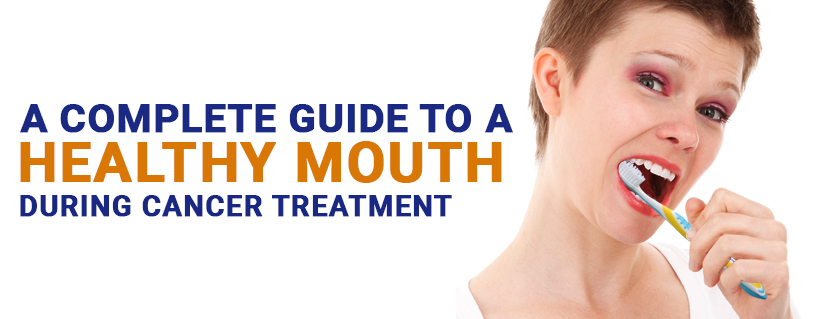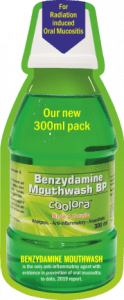Menu

Date: 28th. July. 2017
Chemotherapy and radiation, two of the most common cancer treatment options have many side effects. Most people know that hair loss, nausea, appetite loss, and fatigue are common among cancer patients. But, many are unaware about the side-effects that are harmful to oral health. According to NIDCR, one-third of all cancer patients suffer from oral problems.
Although, the side-effects you experience will depend on the drugs used and how your body respond to them. Mouth problems caused due to chemo can make it difficult to eat, talk, and swallow. If the condition gets worse, your oncologist may have to lower the dosage or even stop the treatment altogether.
Cancerous cells tend to rapidly grow and divide. Chemotherapy drugs are designed to kill these fast-growing ‘active’ cells. However, some healthy cells – like those in your mouth, digestive system, and hair – are also active. As a result, many of the healthy active cells are also damaged during chemotherapy.
Oral problems associated with chemotherapy will cause complications with your teeth, gums, the soft inner lining of the mouth, and the salivary glands. Some of the common complaints patients have are:
Most side-effects from chemotherapy fade away once the treatment ends. If you continue to experience them after the treatment, make sure that you consult your doctor.
Since side-effects to oral treatments can hamper your treatment, you need to involve your dentist at various steps. If your mouth is healthy, you can keep some side-effects in check and focus on getting better.
Your mouth must be as healthy as possible or you will be susceptible to infections. Below listed are some things you must do on a regular basis for taking care of your oral hygiene before you start the treatment:
Book an appointment with your dentist soon after you are told that chemotherapy or radiation will be your course of treatment. He or she can assess your oral health and determine if you need to undergo a dental procedure before chemo. Depending on the situation, your dentist may:
-Prescribe fluoride treatments for cavity prevention
-Fill any cavities
-Extract infected teeth
-Work on crowns or bridges
-Treat gum disease
Use a fluoride toothpaste and a soft-bristled toothbrush to brush your teeth twice a day. Make sure that you brush for at least two minutes and clean your tongue as well.
Brushing alone cannot clean all parts of your teeth. Ensure that you floss at least once a day, preferably before going to the bed. This will get rid of the plaque stuck between your teeth. You can also use floss sticks if you find it difficult to use regular floss.
Rinsing often will clear out food particles and reduce bacteria action. Rinse after every meal with water and use a mouthwash twice a day after brushing and flossing. This will significantly decrease the chances of decay and gum disease.
Cigarettes and other tobacco products wreak havoc on your mouth. They stain your teeth, reduce blood flow to the gums, cause bad breath and more. In addition, they increase the risk of oral cancer. Try to reduce tobacco consumption and eventually quit altogether.
Since radiation and chemotherapy weaken your immune system, it is important to eat foods that reinforce your white blood cells. Eat foods that are rich in vitamins and other nutrients. Ensure that your diet contains fruits, vegetables, fat-free dairy, grains, and protein sources like eggs, legumes, and meats.
It is just as important to maintain your oral hygiene during your treatment as it was before starting it. Brushing, flossing, and rinsing will continue to be a major part of your oral care routine. However, you will need to take extra care as you might experience some oral side-effects from your cancer treatment. Here are some of the most common ones and what you can do about them:
Dry mouth or xerostomia is a condition caused due to lack of saliva in your mouth and is common among cancer patients. It is caused when your salivary glands aren’t producing enough saliva. Xerostomia causes a burning sensation in the mouth, hoarseness, and difficulty in speaking and swallowing. It also increases the risk of tooth decay and gum disease.
For relief, your dentist may prescribe you an artificial saliva substitute, which reduces the discomfort caused due to dry mouth. You can also increase your water intake to keep your mouth moist. Avoiding dehydrating beverages like coffee, tea, and alcohol will keep you from further aggravating the situation. You can also chew sugar-free gum to increase saliva production.
Mouth sores are ulcers that appear on the soft tissues of the mouth. During your treatment, you may develop mild mouth sores on your gums, tongue, cheeks or lips. They may even cause mild to severe bleeding.
If your sores are serious, make sure that you talk to your oncologist and dentist about them. They may prescribe pain relieving and anti-inflammatory creams. Also, make sure that you don’t worsen the sore while brushing and eating.
Jaw pain is a common complaint among patients who have undergone radiation therapy near the head or neck. Radiation waves cause inflammation and scarring around the jaw muscles, causing facial and jaw pain. You may also feel tenderness in your jaw, headaches, difficulty during biting, and pain in and around the ear.
To relieve stiff jaw muscles, try opening and closing your mouth as wide as you can without causing pain. Repeat this exercise 20 times and do it 3 times a day. Teeth grinding or bruxism caused due to stress may also be the reason for your jaw pain. If that’s the case, then your dentist may prescribe muscle relaxants or anti-inflammatory medicines.
Your immune system can become vulnerable due to chemotherapy and bone marrow transplant. As a result, you become prone to infection. If your gums have been affected due to chemotherapy, you may experience tenderness, inflammation, loose teeth, and bleeding.
If you notice these symptoms, visit your dentist. He or she may prescribe an anti-inflammatory or steroid rinse. Antibacterial mouthwashes like Hexidine are also effective at eliminating harmful bacteria from your mouth. Maintaining oral hygiene beforehand can greatly minimize the risk of this side-effect.
Once your cancer treatment ends, you may experience oral problems like tooth decay due to the side-effects. Visit your dentist as well so that he or she can carefully examine your mouth. Depending on the conditions, your treatment will include root canals, bridge or crown work, or cavity filling. Make sure that you continue taking good care of your oral health by regularly brushing, flossing, and rinsing.
Good oral hygiene is the key to avoid major oral complications during your cancer treatment. Make sure you consult your dentist and oncologist and talk to them about any problems that may arise. They are your best guides in helping you manage the side-effects.


| PRODUCTS | QTY | PRICE | VALUE in INR |
|---|
| PRODUCTS | QTY | PRICE | VALUE in INR |
|---|